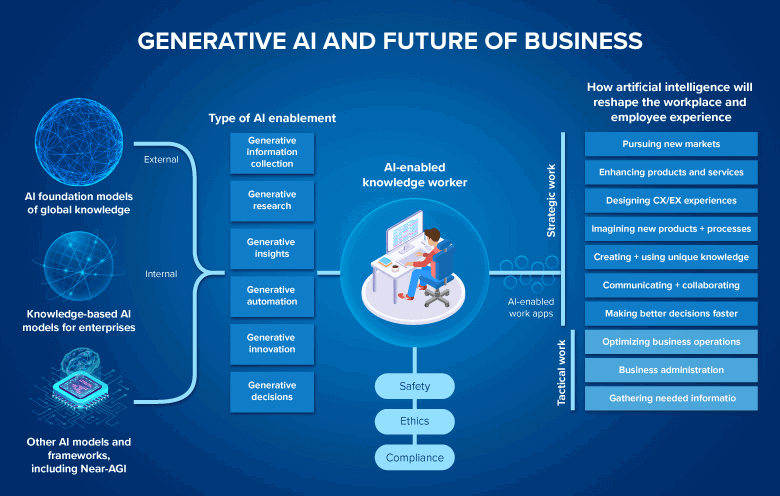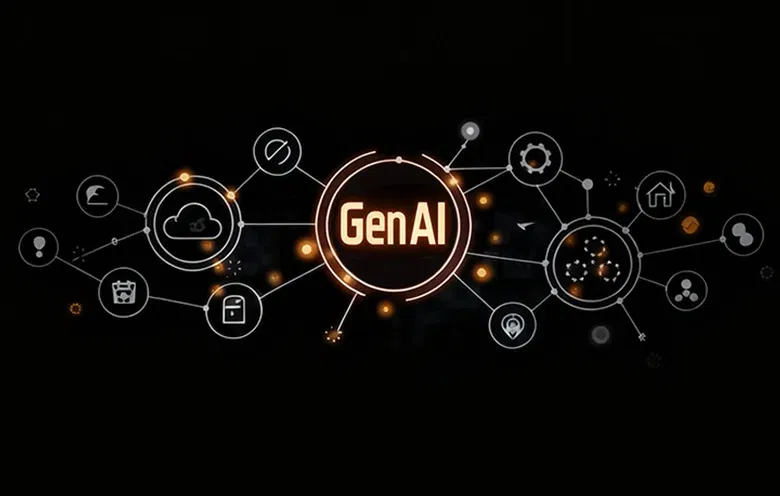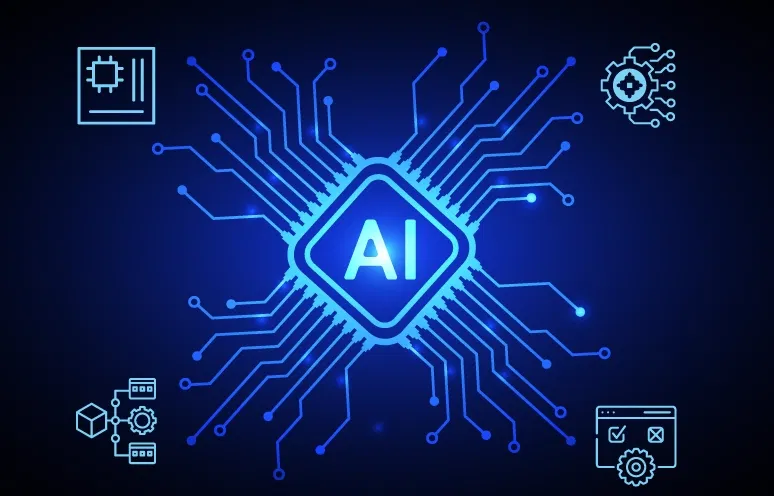Generative AI has emerged as a technology that enables organizations to transform how they engage with customers, develop products, and solve problems. It offers new business opportunities, from improving customer service to accelerating product development. Unlike traditional automation, it doesn’t just follow the rules; it creates, adapts, and personalizes in real-time. In this blog, we will explore how generative AI is currently being used, the opportunities it opens, and real-world use cases that demonstrate its impact across industries.
What is the current state of generative AI in business?
Generative AI integration into business has led to significant advancements in recent years. Today, many companies across diverse industries are harnessing this transformative technology to streamline their operations and drive innovation.
In the realm of content creation, generative AI is revolutionizing marketing campaigns by generating compelling and tailored content that resonates with target audiences. Businesses use it to develop realistic product prototypes and designs, empowering them to bring their ideas to life swiftly and efficiently.
Moreover, generative AI is instrumental in data analysis, enabling businesses to derive valuable insights from vast amounts of information and make data-driven decisions. While the current state of generative AI in business is promising, there is still immense untapped potential waiting to be explored.
By 2025, 30% of outbound messages from large organizations will be synthetically generated.
-Gartner
Benefits of generative AI for business
Generative AI presents a wide array of opportunities and benefits for businesses seeking to transform their operations and drive innovation. Some of the key advantages of generative AI for businesses across industries are:
- Enhanced content creation: Generative AI can make daily tasks more efficient and faster by creating various forms of content from marketing campaigns and internal memos to summarizing meetings and documents. It enhances creativity and reduces content creation time.
- Innovative product designs: It helps brainstorm product design ideas by identifying issues with the existing product concept and provides suggestions to improve the existing concept.
- Efficient data analysis: By analyzing large sets of data, generative AI predicts outcomes, and identifies patterns, trends, and insights, helping businesses address potential challenges and make informed decisions.
- Personalized marketing campaigns: Generative AI analyzes customer data to study their behavior and creates marketing campaigns that include customized recommendations and offers.
- Improved customer experiences: It enables instant customer support by understanding natural language queries, analyzing the context of the environment, and referencing historical conversations to deliver accurate and reliable solutions.
- Increased efficiency and productivity: Generative AI automates tasks, streamlines workflows, and accelerates decision-making, which improves overall efficiency by freeing employees to focus on strategic initiatives.
How is generative AI redefining business across major industries?
From automating content to streamlining complex workflows, GenAI empowers industries to act faster, smarter, and with greater impact. Here is how generative AI transforms different industries:
1. Manufacturing
Generative AI is revolutionizing manufacturing with faster insights, downtime reduction, and increased productivity. It enables operators and engineers to take quicker, data-based decisions by making difficult information such as maintenance records and operating data more easily available. These yields optimized production, enhanced equipment health monitoring, and smarter supply chain management.
2. Retail
Retail companies are applying generative AI to automate operations from inventory and store management to customer service and supplier interaction. AI-powered apps steer personalized shopping streamlined inventory management, and accelerated order fulfillment, all without the need for intricate coding. No-code GenAI tools enable retailers to innovate quickly and keep pace with evolving customer expectations. With increasing investment in technology like AR, VR, and chatbots, the retail sector is going into an extremely immersive, data-driven age of customer engagement.
3. Finance and banking
Banks are seeing measurable enhancements in productivity, with McKinsey estimating an annual value addition of up to $340 billion from GenAI.
GenAI interprets massive volumes of customer and market data to uncover patterns that support smarter risk management, fraud detection, and loan processing. Institutions are using it to deliver hyper-personalized experiences in areas like investment planning and marketing. GenAI also supports real-time regulatory compliance through automated reporting and monitoring.
4. Supply chain
GenAI processes advanced and interrelated data sets automatically, rendering them free from bias, allowing supply chain leaders to respond faster and more intelligently. It optimizes the accuracy of demand forecasting, determines the optimal levels of inventory, and lessens risks even in uncertain markets. By analyzing trends, GenAI improves route planning, production scheduling, and vendor sourcing. It ensures real-time visibility into operations, allowing decision-makers to respond ahead of disruptions. Such AI-driven insights not only enhance efficiency but also reduce operational costs across the value chain.
5. Insurance
Insurance companies are streamlining complex tasks such as claims processing, underwriting, and policy maintenance using GenAI-capable applications.
These solutions automate mundane workflows, reducing turnaround times while improving operational efficiency. With no-code AI app, insurers can quickly create and implement custom solutions. This responsiveness enables teams to scale rapidly during business peaks and keep pace with changing compliance standards. User-friendly interfaces empower non-technical personnel to drive innovation, enabling faster, more intelligent service delivery across the enterprise.

Real-world use case of GenAI adoption
Businesses are adopting GenAI to automate customer query responses, reducing resolution times and freeing teams to handle complex cases more efficiently. Here are a few real-world examples:
Uber adopted GenAI to enhance productivity:
Uber is using AI agents to help employees be more productive, save time, and be even more effective at work. For customer service representatives, the company launched new tools that summarize communications with users and can even surface context from previous interactions, to improve support quality and speed.
- Challenges they faced
Uber’s customer support teams manage a large number of daily interactions, from ride-related issues to accounts or payment disputes. One of the primary issues was the time-consuming process of looking at previous conversations and manually pulling context from across several systems. Not only did these slow down responses but also affected the quality and consistency of customer support, particularly for complicated or repeated cases.
- AI adoption
In response to such inefficiencies, Uber implemented generative AI to equip its support agents with productivity-driven tools. Uber incorporated AI-driven summarization and context retrieval capabilities into its internal support platforms. These capabilities auto-create brief summaries of previous conversations and highlight key details throughout a customer experience on the platform.
- How was the issue resolved using generative AI?
Through the use of generative AI, Uber allowed its customer support agents to see the entire history of a user’s prior interactions in just seconds. The AI sums up prior support requests, messages, and actions taken automatically, enabling agents to provide quicker, better-informed responses. Support teams are now more productive, cutting average handling time, and increasing customer satisfaction overall, leaving agents more time to spend on high-value tasks.
BMW Group adopted GenAI to streamline supply chain:
BMW Group uses GenAI to optimize industrial planning and supply chains processes. This involves scanning assets and using Vertex AI to create 3D models that act as digital twins, which perform thousands of simulations to optimize distribution efficiency.
- Challenges they faced
BMW Group encountered growing complexity in its supply chain and industrial planning processes. As production operations expanded across global locations, managing physical assets, ensuring layout efficiency, and planning distribution became increasingly difficult. The manual approach to asset visualization and layout planning limited scalability, often leading to planning inefficiencies, increased operational costs, and delayed decision-making.
- AI adoption
To address these challenges, BMW Group deployed a generative AI-powered solution that streamlines and enhances industrial planning. By leveraging Google Cloud’s Vertex AI, they implemented a system that scans physical assets and generates real-time 3D digital twins in the production environment. These digital replicas allow the simulation of countless layout and logistics scenarios within a virtual space.
- How was the issue resolved using generative AI?
With the help of generative AI, BMW was able to transform its traditional asset and layout planning process into a data-driven, simulation-based approach. The 3D digital twins enabled by GenAI allowed the team to perform thousands of simulations, replicating supply chain scenarios and identifying the most efficient setup without disrupting physical operations. This resulted in:
- Faster decision-making cycles
- Optimized space and asset utilization
- Improved distribution efficiency
- Reduced planning errors and costs
Mercedes Benz adopted GenAI to enhance its e-commerce capabilities:
Mercedes Benz is infusing e-commerce capabilities into its online storefront with a generative AI-powered smart sales assistant.
- Challenges they faced
Mercedes-Benz encountered increasing demands to update its online buying experience to address changing customer needs. Customers increasingly desired to shop through digital mediums but found the company’s traditional e-commerce infrastructure wanting in terms of personalization, ease of navigation, and live assistance. Customers frequently found it challenging to identify the appropriate vehicle model or comprehend configuration options, resulting in drop-offs and lost sales opportunities.
- AI adoption
To overcome this gap, Mercedes-Benz incorporated a generative AI-driven smart sales assistant within its online store. The assistant applies natural language processing and large language models to converse with customers, respond to inquiries, suggest appropriate vehicle models, and walk users through configuration and buying processes.
- How was the issue resolved using generative AI?
Mercedes-Benz used generative AI to convert its static e-commerce site into a dynamic, customer-engaging digital showroom. The intelligent assistant interacts with customers in real time, providing personalized advice and accelerating the decision-making process. It not only enhanced customer satisfaction but also boosted conversion rates and declined cart abandonment. By closing gaps in information and making complex product decisions easier, Mercedes-Benz designed a frictionless digital buying experience that replicates the focus of a physical dealership interaction.
Woven by Toyota adopted GenAI to enable autonomous driving:
Woven – Toyota’s investment in the future of mobility is partnering with Google to leverage vast amounts of data and AI to enable autonomous driving, supported by thousands of ML workloads on Google Cloud’s AI Hypercomputer. This has resulted in 50% of total cost-of-ownership savings to support automated driving.
- Challenges they faced
As Woven advanced its mission to build safe, connected, and autonomous mobility solutions, it faced a critical challenge: managing and processing massive volumes of sensor data generated by autonomous vehicles. These workloads range from perception, mapping, localization, and planning. It requires intensive Machine Learning (ML) operations and vast computational resources. The legacy infrastructure struggled with performance bottlenecks, high operational costs, and scalability issues, limiting progress in real-time decision-making for autonomous driving.
- AI adoption
To overcome these limitations, Woven partnered with Google Cloud and adopted generative AI technologies as part of its transformation strategy. They leveraged Google Cloud’s AI Hypercomputer, an advanced infrastructure optimized for AI workloads, to run thousands of ML models efficiently. Generative AI was used to simulate driving scenarios, generate training data for edge-case situations, and accelerate the development of perception systems and vehicle intelligence models.
- How was the issue resolved using generative AI?
By adopting generative AI and cloud-based ML infrastructure, Woven drastically enhanced its ability to process and learn from complex driving data. Synthetic data generation enabled the team to train and test autonomous systems, reducing reliance on physical testing. This not only sped up model training cycles but also improved safety validation for rare events.
As a result, Woven achieved 50% total cost of ownership (TCO) savings, a significant reduction in infrastructure and operational costs while also improving model performance, scalability, and development velocity for autonomous driving solutions.
Wagestream adopted Gen AI to streamline customer inquiries:
Wagestream, a financial wellbeing platform for employee benefits, uses Gemini models to handle more than 80% of its internal customer inquiries, including questions about payment dates, balances, and more.
- Challenges they faced
Wagestream was under increasing pressure to reply rapidly and effectively to a growing number of internal customer service requests. Inquiries about pay dates, account activity, and balances were inundating their support teams with delays in replying, high operational overheads, and variable service levels during busy times.
- AI adoption
To overcome such difficulties, Wagestream incorporated Google’s Gemini models, a suite of generative AI solutions, into their internal support systems. The intention was to automate the resolution of repetitive, fact-based queries and free human agents for more intricate interactions.
- How was the issue resolved using generative AI?
With generative AI, Wagestream automated more than 80% of its customer service requests internally. Gemini models were trained to recognize and answer repetitive questions such as “When’s my next pay date?” or “What is my balance?” in natural language. The automation resulted in improved response times, minimized workload for human representatives, and ensured uniform support experience for users.
The use of generative AI not only enhanced operational effectiveness but also enriched the overall employee experience, a central pillar of Wagestream’s purpose.
Japan airlines adopted GenAI to promote new tourism spots
Japan Airlines uses generative AI platform, to create new tourism spots that will broadcast in-flight and via YouTube Ads.
- Challenge they faced
Japan Airlines (JAL) identified a recurring challenge, many of Japan’s local tourism spots, especially lesser-known ones, struggled to attract attention from travelers. Despite high in-flight engagement and a growing interest in authentic travel experiences, these locations remained under-visited due to limited exposure and lack of engaging content that resonated with a global audience.
- AI adoption
To tackle this challenge, Japan Airlines adopted generative AI video platform. These technologies allowed them to rapidly create short-form, personalized video content showcasing emerging and unexplored travel spots. The videos were deployed across in-flight entertainment systems and YouTube Ads, enabling high visibility among domestic and international travelers.
- How was the issue resolved using generative AI?
By using generative AI, JAL could produce high-quality, emotionally compelling tourism videos at scale, something that would have taken much longer using traditional production methods. The content not only highlighted unique destinations but also adapted messaging based on target audience profiles. As a result, engagement increased across digital channels, interest in lesser-known destinations grew, and JAL enhanced its brand as a promoter of authentic Japanese travel experiences.
Best Buy adopted GenAI to enhance customer support
Best Buy, a customer electronic company, uses generative AI-powered virtual assistant to troubleshoot product issues and reschedule order deliveries. Moreover, in-store and digital customer-service associates are also gaining GenAI tools to better serve customers anywhere they need help.
- Challenges they faced
Best Buy faced increasing complexity in handling customer service across channels. Customers experienced delays in issue resolution ranging from product troubleshooting to order changes due to siloed systems and limited support staff availability. The growing volume of service requests puts pressure on both in-store and online teams, leading to inconsistent support experiences.
- AI Adoption
To streamline operations and improve customer satisfaction, Best Buy integrated generative AI across its support systems. They launched a virtual assistant capable of performing tasks such as troubleshooting tech issues, rescheduling deliveries, and managing subscriptions. In addition, customer service associates both in-store and online were equipped with AI tools to assist customers faster and more accurately.
- How was the issue resolved using generative AI?
With generative AI in place, Best Buy significantly reduced response times and support errors. Customers could now self-serve through the AI assistant for common queries, while associates used AI suggestions to offer quicker and more personalized solutions. This not only improved operational efficiency but also created a seamless support experience, whether customers were shopping online or visiting a physical store.
Future-proof your business with generative AI adoption
Generative AI holds immense potential as a catalyst for business transformation in the digital age. As technology continues to advance, and generative AI algorithms become more sophisticated, businesses that embrace and harness this transformative technology will undoubtedly gain a competitive edge. They will thrive in the dynamic business landscape of the future.
As technology matures, organizations that strategically invest in GenAI stand to gain a significant edge in agility, productivity, and innovation. With generative AI consulting, you can leverage the technology to realize its full potential. Embrace the transformative power of generative AI today to ensure your business leads innovation.




